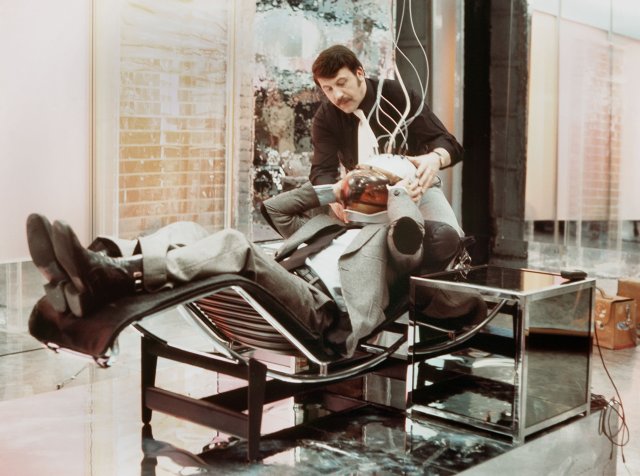An early form of applied cybernertics: scene from the two-part television series “Welt am Wire” by Rainer Werner Fassbinder from 1973.
Photo: wdr/dpa
Resentment makes hearts go rancid, imagination stiffens and people don’t really want to do anything with society anymore. When neoliberalism came to power in the form of the grim merchant children Richard Milhouse Nixon and Maggie “There is no such thing as society” Thatcher, resentment blossomed into a social psychological reason for state. The world became radically market-hungry and loyal to the elite, and the old promise of a good life became even more unlikely for large parts of humanity.
One person who wanted to understand why people, the oppressed, who have to work day in and day out, are always in danger of becoming dull, losing their dreams, dying and leaving nothing behind, was the cultural theorist Mark Fisher. He was born in Leicester, northern England, in 1968; In 2017, as a well-known man, he took his own life. Plagued by depression since his youth, Fisher did not want to accept that mental health problems should be the private problem of Mimosa, but realized that the social order in which we live leads us to become dark inside. The recently deceased theater maker René Pollesch once said in a radio play that “my inner life” only corresponded to “the great depression out there.”
Fisher spent the 90s at university, at concerts, in clubs. He was fascinated by the jungle (and post punk) music genre, Marxist as well as postmodern philosophy, and was part of the “Cybernetic Culture Research Unit” at the University of Warwick, which dealt with the influence of modern technology on everyday life. His blog “K-Punk” gained him a large readership, because pop culture and social criticism have rarely been written about so cleverly.
His last seminar has now been published by Brumaire-Verlag in a German translation by Alexander Brentler. In the 2016/17 winter semester, Fisher taught a course with the controversial title “Longing for Capitalism.” Only half of the meetings took place before the students received the news of their lecturer’s death. In addition to the transcription of the five sessions, the book includes an insightful foreword by editor Matt Colquhoun, which provides a good introduction to Fisher’s thinking. Numerous footnotes establish connections, contextualize, and provide information on where to continue reading. This is solved in an exemplary manner. There are also two appendices: the complete seminar plan with a literature list and a playlist with 16 tracks, “No More Miserable Monday Mornings,” which Fisher published on his blog “K-Punk” in 2016. The participants in his course listened to the playlist together when they learned of Fisher’s death and continued the seminar as a reading group.
Fisher wonders how post-capitalist desire might be thought of. On the one hand, desires, libidos, and desires help us not to completely enter into capitalism, but on the other hand, they do not guarantee that we actually want to overcome it. Often the little satisfactions and sedatives in everyday life help us to secretly be content with everything. Fisher discusses all sorts of historical suggestions. He doesn’t want to resign himself to the negativity, but instead wants to outline positive projects. The students ask questions that readers should keep in mind. The second session is about the counter-culture of the sixties and the important role of an exposed representative of critical theory, Herbert Marcuse, on the young people who wanted to live differently and were ready to fight against the structures that stunted life let.
In the next session, Lukács’ concept of class consciousness will be replaced by the feminist theorist Nancy Hartsock’s term “group consciousness” in order to prevent hardening of anti-identity politics. In the end, when there is division, only those in power are laughing up their sleeves. Then Fisher gets to the bottom of the question of how Nixon, by fomenting resentment within the working class against the hippies, managed to get trade unions, contrary to their class interests, to vote for the Republican. A more recent example is the Tory politician Louise Mensch, who during the Occupy protests denied any legitimacy and credibility to demonstrators who were out and about with smartphones and stocked up on coffee at Starbucks. And then, based on a text by the dark philosopher and Marxist renegade Jean-Francois Lyotard, it’s about the unacknowledged desire for submission, the pleasure in being fobbed off with the junk of this world.
Fisher’s last sentence, which was transcribed from the seminar, is quite profane: “You can write me an email at any time.” I was told that Fisher also replied in detail to people who were completely unknown to him within a few days. Now it is up to his readers to continue Fisher’s project and overcome the capitalist realism that tries to prohibit us from imagining anything other than what we have in front of our own noses. There are plenty of thoughts on how to continue spinning – in the best sense of the word – in these seminars!
Mark Fisher: Longing for Capitalism. A.d. English v. Alexander Brentler. Brumaire, 296 S, br., 24 €.
Book launch: this Wednesday at 8 p.m. in the Literature Forum of the Brecht House in Berlin. Matt Colquhoun and Alexander Brentler will discuss, moderated by Adelaide Ivánova.
Become a member of the nd.Genossenschaft!

Since January 1, 2022, the »nd« will be published as an independent left-wing newspaper owned by the staff and readers. Be there and support media diversity and visible left-wing positions as a cooperative member. Fill out the membership form now.
More information on www.dasnd.de/genossenschaft
link sbobet slot demo sbobet sbobet
